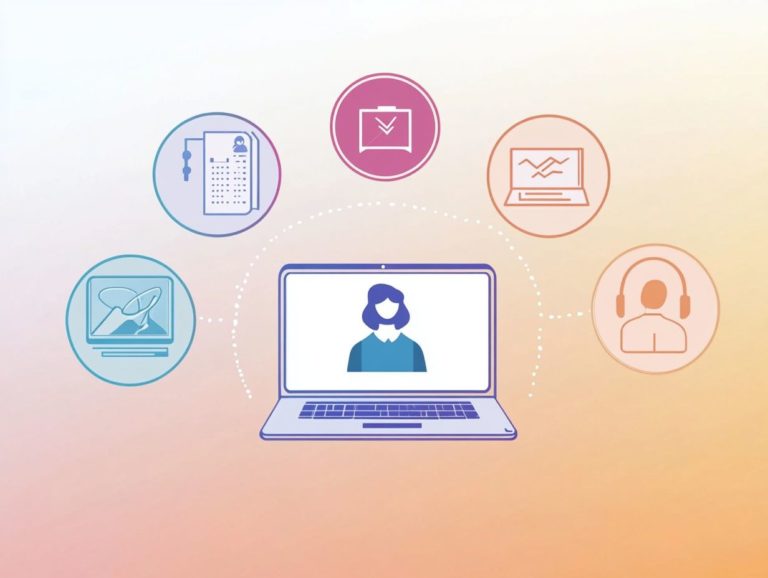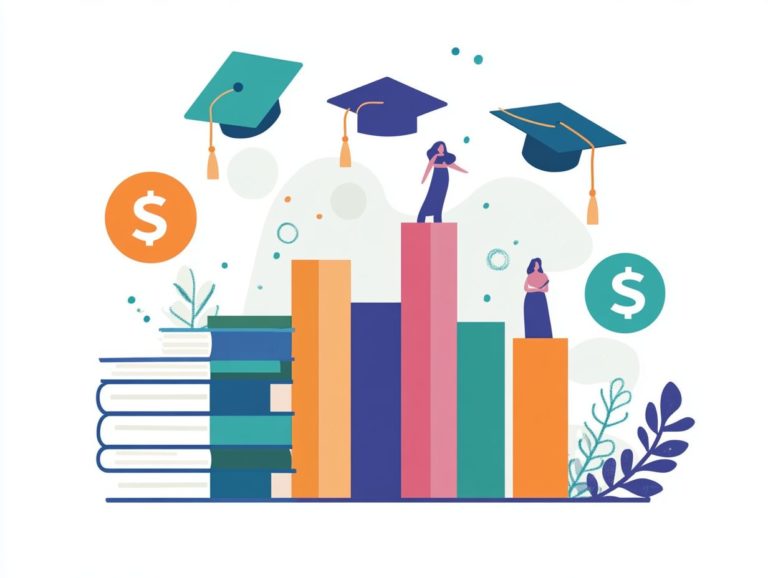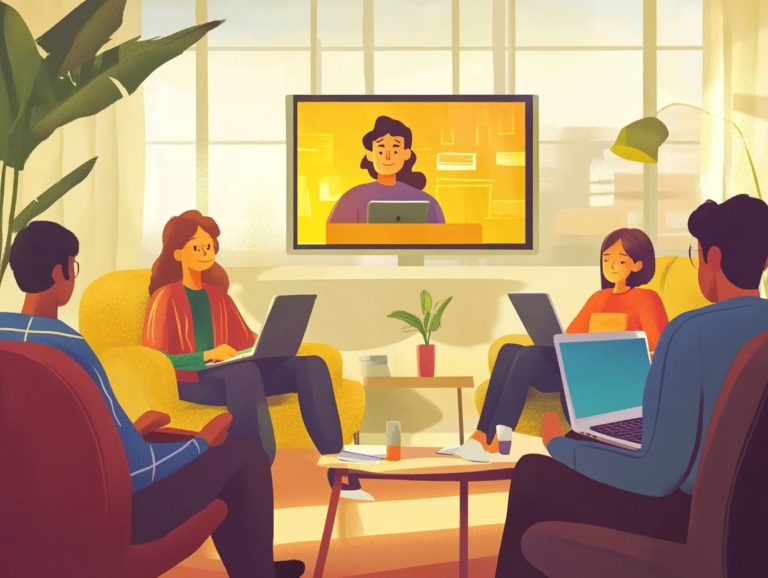The Role of Technology in Online Bachelor’s Degrees
The landscape of higher education has undergone a remarkable transformation with the emergence of online bachelor’s degrees.
This exploration delves into the intriguing history and swift evolution of online learning, showcasing pivotal technological advancements that have reshaped education. You’ll discover numerous benefits, including unparalleled flexibility and cost savings, while also confronting challenges students encounter, such as maintaining engagement and managing technical issues.
It will also highlight emerging trends poised to define the future of online education. Dive in as you uncover the dynamic role technology plays in this exciting new era of learning.
Contents
- Key Takeaways:
- The Evolution of Online Bachelor’s Degrees
- Advancements in Technology and Online Education
- The Benefits of Online Bachelor’s Degrees
- Challenges of Online Learning
- The Future of Online Bachelor’s Degrees
- Frequently Asked Questions
- 1. What is the role of technology in online bachelor’s degrees?
- 2. How does technology enhance the learning experience in online bachelor’s degrees?
- 3. What type of technology is typically used in online bachelor’s degrees?
- 4. Can students with limited technology skills still succeed in an online bachelor’s degree program?
- 5. How does technology make online bachelor’s degrees more accessible?
- 6. Are there any potential disadvantages of relying on technology in online bachelor’s degrees?
Key Takeaways:

- Technology revolutionizes online bachelor’s degrees.
- Access education remotely, offering flexibility and savings.
- Challenges like tech issues must be resolved for success.
The Evolution of Online Bachelor’s Degrees
The evolution of online bachelor s degrees has transformed education. You can now access diverse programs that suit your learning style.
As online learning gains traction, many institutions have adapted their curricula to incorporate digital formats and asynchronous courses. This paves the way for career advancement while honing your time management skills.
This transformation meets the needs of non-traditional learners like you and aligns with the ever-evolving job market, fostering academic success through increased engagement and robust support from faculty members.
History and Development of Online Learning
Online learning began in the late 20th century. Distance education embraced digital formats, reaching students far and wide.
As technology evolved, especially with the rise of the internet, educational institutions started to innovate, seeking new ways to deliver quality education to a wider audience.
Early trailblazers like Arizona State University and the University of Cincinnati made significant progress by launching robust online programs, making higher education more accessible than ever before.
Statistics from the Bureau of Labor Statistics reveal that the demand for online learning has skyrocketed, with enrollment numbers soaring to nearly 7 million by 2020.
U.S. News & World Report points out that online learning not only meets educational needs but also equips individuals for a changing job market, underscoring the necessity of flexibility and skill development in today’s workforce.
Advancements in Technology and Online Education
Technology has changed online education drastically. You can now enjoy a richer and more personalized learning experience.
With interactive online courses and virtual classrooms tailored to the diverse needs of college students, you can explore educational opportunities that truly accommodate your unique learning style.
Impact of Technology on Online Learning
The impact of technology on online learning is nothing short of transformative, granting you a more personalized and flexible educational experience as you pursue your degree. To maximize your journey, it’s essential to explore understanding the curriculum of online bachelor’s programs.
By utilizing tools that help you manage your courses and track progress, you can streamline your course materials and effortlessly stay organized and focused.
- Engaging tools like quizzes, simulations, and gamified elements capture your attention and encourage active participation, enhancing your retention of knowledge.
- Communication technologies, such as video conferencing and discussion forums, cultivate a collaborative environment that fosters peer interaction and support, ultimately leading to improved academic outcomes.
Together, these technologies play a pivotal role in reshaping the online learning landscape, offering a rich and engaging platform that motivates you to excel.
The Benefits of Online Bachelor’s Degrees

Online bachelor’s degrees present a wealth of advantages. Chief among them is the flexibility in scheduling.
This flexibility allows you to customize your study timetable to accommodate your personal and professional commitments. It creates an optimal environment for your academic success.
Flexibility and Accessibility
The flexibility and accessibility of online learning give the power for you to navigate your coursework at your own pace. This allows for a seamless balance between your education, work, and other responsibilities.
This structure enables you to engage with your studies from virtually anywhere, breaking down the limitations of distance that traditional classrooms often impose.
With the freedom to tailor your study schedule around personal commitments, you can take the time to thoroughly absorb the material. You can also participate in discussions and complete assignments at your convenience.
This self-directed approach nurtures greater accountability and accommodates diverse learning styles. It ensures you connect with the content in a manner that resonates most effectively with you.
Cost Savings
One of the most compelling advantages of pursuing an online bachelor’s degree is the reduced cost compared to traditional on-campus programs. This can significantly alleviate the financial strain of tuition fees for you.
This cost reduction goes beyond just tuition. Enrolling in an online program means you won’t need to commute daily, allowing you to save a considerable amount on gas or public transportation expenses.
Studying from home also helps you sidestep extra housing costs. Many online programs provide digital learning materials at no additional charge, further enhancing your financial savings.
By thoughtfully planning your education through online degrees, you can cultivate a more manageable financial future while acquiring a valuable education that can boost your career prospects.
Challenges of Online Learning
Online learning opens up exciting new possibilities! However, it also brings challenges that can affect your educational experience.
Technical issues may disrupt your coursework, and there’s an inherent need for strong student engagement to ensure your academic success.
Technical Issues and Support

Technical issues in online learning can really throw you off track. Making strong support for students and effective solutions essential for achieving academic success.
You may encounter challenges such as connectivity problems, software glitches, and navigating unfamiliar platforms. These problems can be annoying and may lead to disengagement, ultimately hindering your overall progress.
That s why accessible faculty support and proactive student advisors are crucial. They provide timely assistance and guide you through these hurdles, ensuring that technological barriers don t compromise the quality of your online education.
By facilitating open communication, they cultivate a supportive learning environment, giving you the power to thrive despite any technical setbacks.
Maintaining Student Engagement
Maintaining student engagement in online classes is essential. It directly impacts the effectiveness of your educational programs and enriches the overall learning experience.
When you prioritize interaction, you not only capture attention but also enhance comprehension. This makes your lessons more memorable.
Incorporating interactive activities like quizzes, breakout discussions, and collaborative projects can ignite enthusiasm and motivate students to participate actively.
Your involvement as an educator is equally crucial. When you check in frequently and provide personalized feedback, you nurture student confidence and investment in their learning journey.
Creating a sense of community among students fosters connections through group work and peer support. This helps to alleviate the isolation that often accompanies virtual environments.
By employing these strategies, you can transform online learning into an engaging and dynamic experience that resonates with your students. Explore the many online degree options available to you today!
The Future of Online Bachelor’s Degrees
The future of online bachelor’s degrees is set for remarkable growth and innovation. For those looking to navigate this landscape successfully, tips for succeeding in an online bachelor’s degree program will be essential, as this evolution will be propelled by emerging trends in information technology and the shifting demands of the job market.
Institutions continually adapt to provide high-quality online education that meets your needs and aspirations.
Trends and Potential Developments
Emerging trends in online education are poised to transform your learning experience as you pursue an IT degree or other technical qualifications.
One standout trend is the integration of artificial intelligence, which personalizes your learning journey and delivers tailored feedback. This ensures that your education aligns perfectly with your unique needs.
Adaptive learning technologies adjust to your learning speed, granting you the flexibility to advance at your own pace, guided by your grasp of the material.
Collaboration with industry professionals offers practical insights and valuable networking opportunities, effectively bridging the gap between theoretical knowledge and real-world applications.
These advancements are redefining how education is delivered and reshaping the essence of acquiring technical skills in an ever-evolving landscape.
Frequently Asked Questions
1. What is the role of technology in online bachelor’s degrees?
Technology plays a crucial role by providing a platform for students to access course materials, participate in virtual classrooms, and complete assignments and exams.
2. How does technology enhance the learning experience in online bachelor’s degrees?

Technology enhances the learning experience by offering interactive and engaging tools, access to a wide range of resources, and the ability to collaborate with classmates and instructors remotely.
3. What type of technology is typically used in online bachelor’s degrees?
Online bachelor’s degrees often utilize a combination of technologies, including learning management systems, video conferencing software, virtual simulations, and online libraries and databases. To learn more about this format, discover what to expect in an online bachelor’s degree program.
4. Can students with limited technology skills still succeed in an online bachelor’s degree program?
Yes, students with limited technology skills can succeed. Most schools provide resources and support to help students navigate the technology used in their courses.
5. How does technology make online bachelor’s degrees more accessible?
Technology makes online degrees more accessible by removing geographical and time constraints. Students can access course materials and participate in classes from anywhere with an internet connection, facilitating learning for working professionals or those with other commitments.
6. Are there any potential disadvantages of relying on technology in online bachelor’s degrees?
Some disadvantages include technical difficulties, the need for self-motivation and time-management skills, and a lack of face-to-face interaction. However, many schools offer support and resources to help students overcome these challenges and succeed in their online coursework.
Explore the exciting world of online degrees today!






